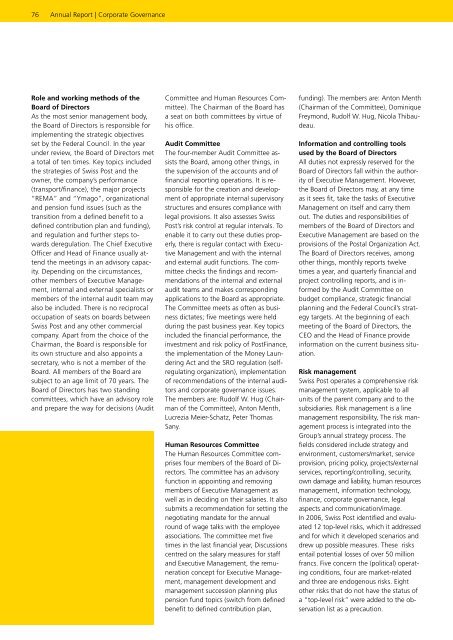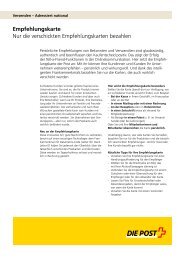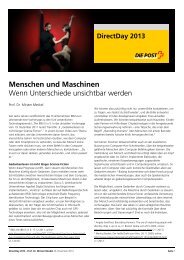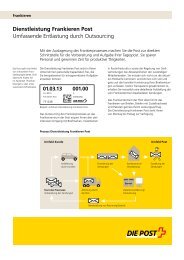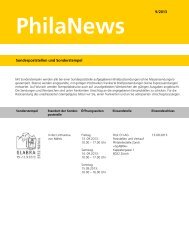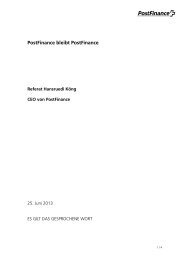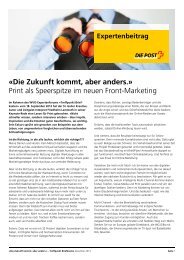Service-oriented - Die Schweizerische Post
Service-oriented - Die Schweizerische Post
Service-oriented - Die Schweizerische Post
Create successful ePaper yourself
Turn your PDF publications into a flip-book with our unique Google optimized e-Paper software.
76 Annual Geschäftsbericht Report | Corporate 2006 Governance<br />
Role and working methods of the<br />
Board of Directors<br />
As the most senior management body,<br />
the Board of irectors is responsible for<br />
implementing the strategic objectives<br />
set by the Federal Council. In the year<br />
under review, the Board of irectors met<br />
a total of ten times. Key topics included<br />
the strategies of Swiss <strong>Post</strong> and the<br />
owner, the company’s performance<br />
(transport/finance), the major projects<br />
“REMA” and “Ymago”, organizational<br />
and pension fund issues (such as the<br />
transition from a defined benefit to a<br />
defined contribution plan and funding),<br />
and regulation and further steps towards<br />
deregulation. The Chief Executive<br />
Officer and Head of Finance usually attend<br />
the meetings in an advisory capacity.<br />
epending on the circumstances,<br />
other members of Executive Management,<br />
internal and external specialists or<br />
members of the internal audit team may<br />
also be included. There is no reciprocal<br />
occupation of seats on boards between<br />
Swiss <strong>Post</strong> and any other commercial<br />
company. Apart from the choice of the<br />
Chairman, the Board is responsible for<br />
its own structure and also appoints a<br />
secretary, who is not a member of the<br />
Board. All members of the Board are<br />
subject to an age limit of 70 years. The<br />
Board of irectors has two standing<br />
committees, which have an advisory role<br />
and prepare the way for decisions (Audit<br />
Committee and Human Resources Committee).<br />
The Chairman of the Board has<br />
a seat on both committees by virtue of<br />
his office.<br />
Audit Committee<br />
The four-member Audit Committee assists<br />
the Board, among other things, in<br />
the supervision of the accounts and of<br />
financial reporting operations. It is responsible<br />
for the creation and development<br />
of appropriate internal supervisory<br />
structures and ensures compliance with<br />
legal provisions. It also assesses Swiss<br />
<strong>Post</strong>’s risk control at regular intervals. To<br />
enable it to carry out these duties properly,<br />
there is regular contact with Executive<br />
Management and with the internal<br />
and external audit functions. The committee<br />
checks the findings and recommendations<br />
of the internal and external<br />
audit teams and makes corresponding<br />
applications to the Board as appropriate.<br />
The Committee meets as often as business<br />
dictates; five meetings were held<br />
during the past business year. Key topics<br />
included the financial performance, the<br />
investment and risk policy of <strong>Post</strong>Finance,<br />
the implementation of the Money Laundering<br />
Act and the SRO regulation (selfregulating<br />
organization), implementation<br />
of recommendations of the internal auditors<br />
and corporate governance issues.<br />
The members are: Rudolf W. Hug (Chairman<br />
of the Committee), Anton Menth,<br />
Lucrezia Meier-Schatz, Peter Thomas<br />
Sany.<br />
Human Resources Committee<br />
The Human Resources Committee comprises<br />
four members of the Board of irectors.<br />
The committee has an advisory<br />
function in appointing and removing<br />
members of Executive Management as<br />
well as in deciding on their salaries. It also<br />
submits a recommendation for setting the<br />
negotiating mandate for the annual<br />
round of wage talks with the employee<br />
associations. The committee met five<br />
times in the last financial year, iscussions<br />
centred on the salary measures for staff<br />
and Executive Management, the remuneration<br />
concept for Executive Management,<br />
management development and<br />
management succession planning plus<br />
pension fund topics (switch from defined<br />
benefit to defined contribution plan,<br />
funding). The members are: Anton Menth<br />
(Chairman of the Committee), ominique<br />
Freymond, Rudolf W. Hug, Nicola Thibaudeau.<br />
Information and controlling tools<br />
used by the Board of Directors<br />
All duties not expressly reserved for the<br />
Board of irectors fall within the authority<br />
of Executive Management. However,<br />
the Board of irectors may, at any time<br />
as it sees fit, take the tasks of Executive<br />
Management on itself and carry them<br />
out. The duties and responsibilities of<br />
members of the Board of irectors and<br />
Executive Management are based on the<br />
provisions of the <strong>Post</strong>al Organization Act.<br />
The Board of irectors receives, among<br />
other things, monthly reports twelve<br />
times a year, and quarterly financial and<br />
project controlling reports, and is informed<br />
by the Audit Committee on<br />
budget compliance, strategic financial<br />
planning and the Federal Council’s strategy<br />
targets. At the beginning of each<br />
meeting of the Board of irectors, the<br />
CEO and the Head of Finance provide<br />
information on the current business situation.<br />
Risk management<br />
Swiss <strong>Post</strong> operates a comprehensive risk<br />
management system, applicable to all<br />
units of the parent company and to the<br />
subsidiaries. Risk management is a line<br />
management responsibility, The risk management<br />
process is integrated into the<br />
Group’s annual strategy process. The<br />
fields considered include strategy and<br />
environment, customers/market, service<br />
provision, pricing policy, projects/external<br />
services, reporting/controlling, security,<br />
own damage and liability, human resources<br />
management, information technology,<br />
finance, corporate governance, legal<br />
aspects and communication/image.<br />
In 2006, Swiss <strong>Post</strong> identified and evaluated<br />
12 top-level risks, which it addressed<br />
and for which it developed scenarios and<br />
drew up possible measures. These risks<br />
entail potential losses of over 50 million<br />
francs. Five concern the (political) operating<br />
conditions, four are market-related<br />
and three are endogenous risks. Eight<br />
other risks that do not have the status of<br />
a “top-level risk” were added to the observation<br />
list as a precaution.


